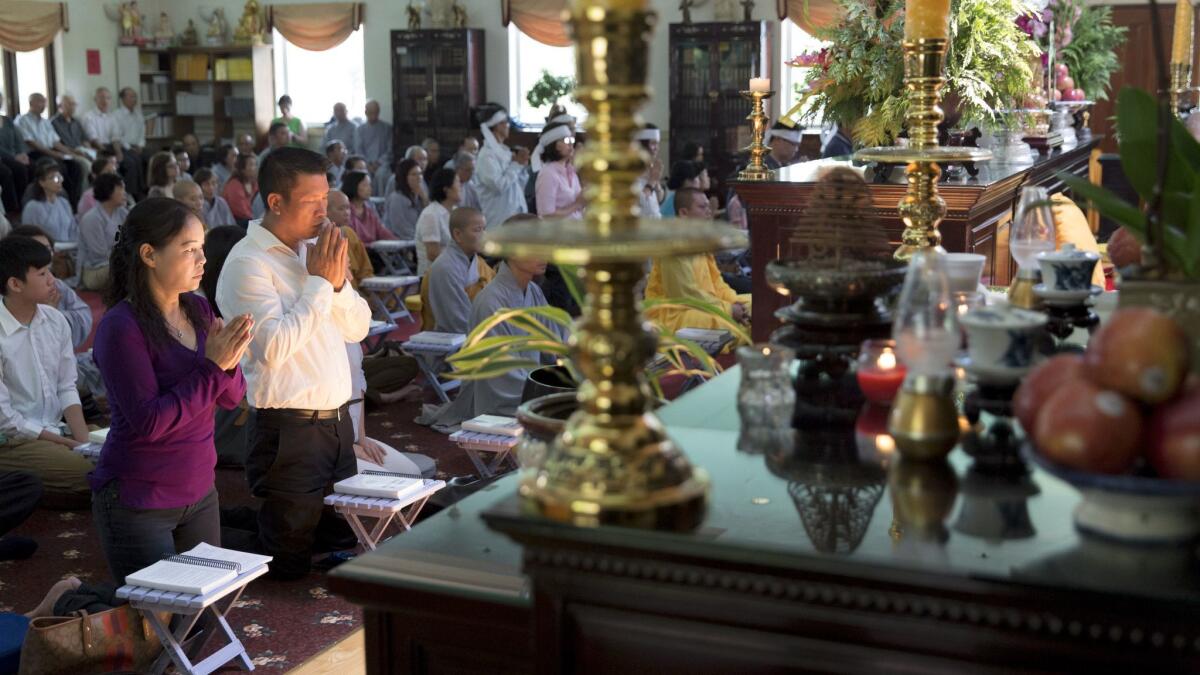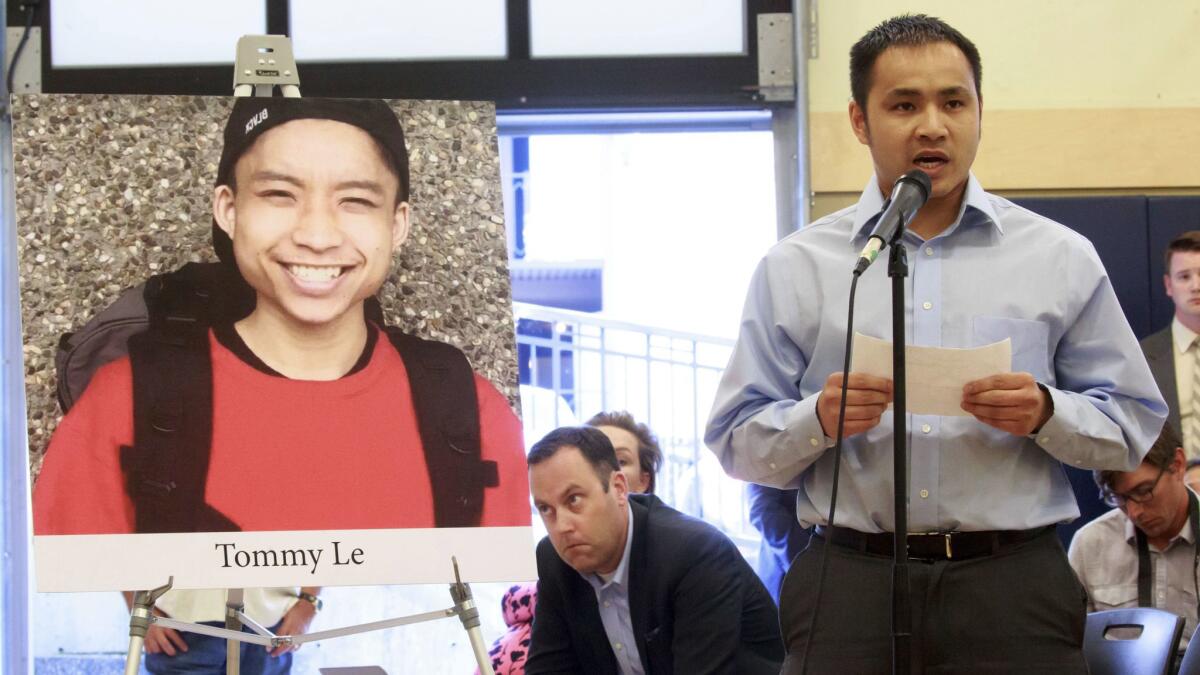He was 20 and unarmed. A police shooting brings Seattle’s Vietnamese Americans into the world of activism

In many ways, it was a familiar story. Neighbors reported a man out in the streets at night making threats with a weapon. Police showed up. (Oct. 5, 2017) (Sign up for our free video newsletter here http://bit.ly/2n6VKPR)
- Share via
In many ways, it was a familiar story. Neighbors reported a man out in the streets at night making threats with a weapon. Police showed up. They thought they saw a knife, and told the man to drop it. They said he didn't obey, and as he moved toward them, an officer fired his Taser and then his gun, hitting the man in the back and killing him.
He was 20 years old, 5 foot 4, 123 pounds with tan skin, and turned out to be unarmed.
But there were no viral videos. No protests. No arrests.
The killing of Tommy Le by police in a Seattle suburb remained a largely private affair at first.
His parents, immigrants from Vietnam, spent 48 days attending Buddhist services. They rarely spoke to journalists who showed up at their door, or to a small cadre of activists that wanted to promote the case.
“Many immigrants and refugees in our community never had a mind for resisting or challenging authority as they were more concerned about survival and gratitude for a new country,” said one activist, Jefferey Vu, a Boeing engineer who works with Le’s uncle. “This national movement around police shootings is new to the Vietnamese.”
But in the nearly four months after the killing, the Vietnamese American community in Seattle — among the largest in the country — has experienced a political awakening around Le.
His death has become a catalyst for a campaign by activists to make it easier in Washington state to prosecute police officers in shooting cases. It has also emerged as a key example in a wider push to require police dash and body cameras, which were not in place when Le was killed.
His family too has now joined the movement against police violence.
“I don’t want my son’s honor to be violated,” said Le’s father, Hoai Le, who settled in the U.S. in 1991 after fleeing persecution in Vietnam. “I want justice. I believe in government.... But my hate for police was really deep when I heard my son was killed.”

Le grew up as the youngest of six children in the city of Burien, about 30 minutes south of Seattle, in a simple house they shared with two aunts, a cousin and his grandmother, whom he helped tend to gardens filled with lilies and Buddha statues.
Incense was burned each day for relatives who had died. Visitors from Vietnam regularly shuffled in and out. Le’s parents had separated when he was younger, and his father, who worked in landscaping, ran the household with help from the elder children and extended family.
Enrolled in an alternative public school after struggling in big classrooms, Le was an avid chess player. He was reading “Faust” and “The Count of Monte Cristo.” He dreamed of a career as a scientist, welder or firefighter.
A few months ago, he told his father he wanted independence and moved into a house with friends just down the street. He worked part time at a casino.
On the afternoon of June 13, Le passed his history final exam, picked up his cap and gown and went home ecstatic for graduation the next day.
Ten hours later, he was dead.
Deputies from the King County Sheriff’s Office said they responded that night to a 911 call reporting that an Asian man was chasing people with a knife in the streets of Burien and yelling that he was “the creator.”
A homeowner fired a warning shot into the ground to scare the man and ran back into his house, police said. Le then began stabbing that resident’s door with the knife, according to police reports. A 911 caller said Le had loudly declared himself to be “the killer.”
When three cops arrived, Le refused to let go of the object in his hand, leading officers to fire Tasers twice, they said. He charged toward them before an officer hit him with a single shot, according to police. Hospitalized, he died the next day.
At his graduation, classmates unaware of his death cheered when his photo appeared on the big screen during a slideshow.
It was around the same time that the family set up an altar for Le in the living room, lighting incense and candles each day. His photos were surrounded by his favorite foods: lemon-lime Gatorade, Flamin’ Hot Cheetos, Oreos, Kit Kats, chocolate chip granola bars and shrimp-flavored puffed wheat chips.
More than a week later, the police changed their account and said the object Le held when they arrived was a pen, not a knife.
They suggested he had stashed a knife at his home a few doors away before their arrival, but they couldn’t say which of those found there it might have been.
Marks on the door of the homeowner who fired the warning shot “could have come from a knife,” police said.
They also announced that Le had been shot three times, not once.
A spokeswoman for the King County Sheriff’s Office said its investigation of the incident could end as soon as this week.
The killing is one of several fatal police shootings over the summer in the Seattle area. Two back-to-back cases — both of them killings of black residents — received the most attention. One was a 30-year-old woman with mental health issues who police said pulled a knife on an officer after calling 911 to report a burglary. The other was a 20-year-old college student whose car was stopped on the incorrect suspicion that he had stolen it.
Those killings spurred demonstrations that typified the efforts of the Black Lives Matter movement to highlight racism in policing. Le’s death wound up sparking a quieter kind of activism, one informed by Vietnamese immigrant culture, where word can spread quickly through the ethnic press, and by Buddhist tradition.
The emerging activists — many of whom work in technology or politics or at pho restaurants — are thinking over how to transform their anger over Le’s death into change on immigration and civil rights. They network on Facebook using names that play off on their heritage, such as “Viets Give a Shiet.”

At a July forum that activists organized, the county sheriff defended his deputies’ actions in front of a group of 150 mostly Asian American residents. Translators were on hand as county officials fielded questions, then shared Vietnamese banh mi sandwiches residents brought them.
Tuần Nguyễn, an 81-year-old former police officer for the South Vietnamese Army, pleaded for better relations between police and the community.
“It’s quite troublesome for me to see the way the police have been militarized across the country and disheartening that we are in a state of war with our people,” he said. “An officer’s duty first and foremost is to be a friend to the community, and the community to be friends to the officers.”
The event was among the few times Le’s family came out of mourning to speak publicly. His father described the pain of losing his son.
“We ran away from police in our country; we came looking for freedom. We did not come here to let my son get shot,” Hoai Le said later in an interview. “We want to prevent this from happening to other families.”
Last month, the family released details of toxicology and autopsy reports that said Le had no drugs or alcohol in his body when he was shot twice in the back and once in the wrist. The sheriff’s department hit back, saying test results for LSD and mushrooms were still pending.
Family members said they would sue King County over the death for $20 million in damages.
The Vietnamese activists recently scored a win: Citing the Le case, the King County Council voted unanimously in September to require the Sheriff’s Office to give all deputies training in de-escalation, crisis prevention and unbiased policing.
While they await answers and ready their suit, Hoai Le and Le’s mother, Dieu Ho, have been discussing whether race played a role in their son’s death, as it allegedly has in so many others.
“I don’t think it had to do with race at all. I think something is wrong with the policeman,” Hoai Le said recently.
“Yes, there is definitely discrimination for Vietnamese Americans,” said Le’s mother, who thought police had targeted her child for the way he looked.
Hoai Le thought some more and changed his mind. Race, he decided, was the only thing that made sense to him in a story that had so far made little.
“Why did the detective come to my house and say my son had a knife? Why was he so sure? Then he changed his mind later? What else could it be?”
Jaweed Kaleem is The Times' national race and justice correspondent. Follow him on Twitter, Facebook and Instagram.
ALSO
The trick play that Nevada used to whisk O.J. Simpson out of prison
Nevada was warming to gun restrictions before this week's mass killing. What now?
Thousands of Puerto Ricans land in Florida, fleeing the misery left by Hurricane Maria
Sign up for Essential California
The most important California stories and recommendations in your inbox every morning.
You may occasionally receive promotional content from the Los Angeles Times.








